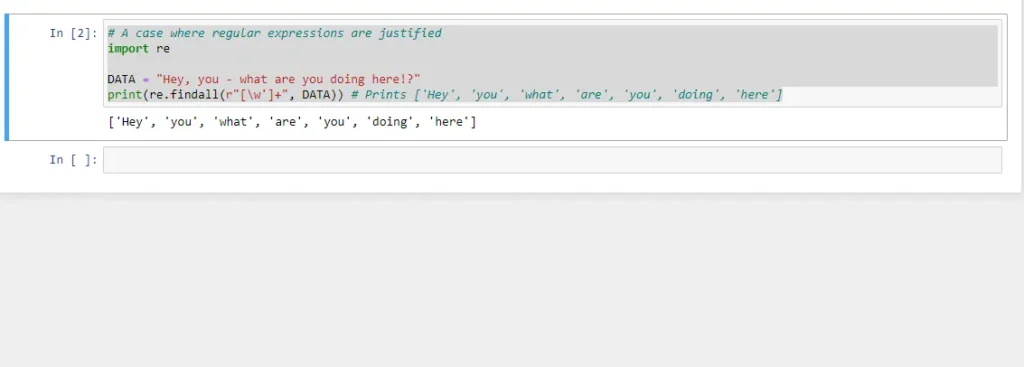Introduction to Split String into Words
When working with text data, extracting individual words from a string can be a common task. However, splitting a string into words becomes more challenging when there are multiple word boundary delimiters, such as punctuation marks, in the text. In this blog post, we will explore how to split strings into words with multiple delimiters like whitespace, punctuation, and other characters in Python.
Understanding the Challenge
Often, when we use the split() method in Python, it only works with a single delimiter. This means that if we have a string like “Hey, you – what are you doing here!?”, using str.split() will not give us the desired output of ['hey', 'you', 'what', 'are', 'you', 'doing', 'here']. Instead, we will end up with words that still contain the punctuation, making further processing challenging.
The Solution: Regular Expressions
To tackle this problem effectively, we can turn to regular expressions. Regular expressions allow us to define complex search patterns for strings, making them particularly useful for tasks like splitting strings with multiple delimiters. Let’s see how we can achieve the desired output using regular expressions in Python.
# A case where regular expressions are justified
import re
DATA = "Hey, you - what are you doing here!?"
print(re.findall(r"[\w']+", DATA)) # Prints ['Hey', 'you', 'what', 'are', 'you', 'doing', 'here']

In the code snippet above, we use the re.findall() function from the re module to extract words based on the defined pattern [w']+. This regex pattern includes alphanumeric characters (w) and the apostrophe character ('), allowing us to capture words despite the presence of punctuation.
Breaking Down the Regex Pattern
[w]: Matches any alphanumeric character.+: Specifies that the preceding element (in this case,[w']) should occur one or more times, ensuring we capture complete words.
By utilizing regular expressions, we can effectively split strings into words while considering various word boundary delimiters.
Conclusion
In conclusion, splitting string into words with multiple word boundary delimiters can be efficiently achieved using regular expressions in Python. By leveraging the power of regex patterns, we can accurately extract words even in the presence of punctuation marks and other characters. This approach enhances the flexibility and robustness of our text processing workflows.
References
Feel free to explore more articles on CodeWithMujahid for valuable insights and tutorials on Python programming and data science.
FAQs
Why is splitting a string into words challenging when there are multiple word boundary delimiters?
When there are multiple delimiters like whitespace, punctuation, and other characters in the text, using traditional methods like the split() function in Python may not provide the desired output, leading to words that still contain the delimiters.
How can regular expressions help in splitting strings with multiple delimiters?
Regular expressions allow us to define complex search patterns for strings, making them ideal for tasks like splitting strings with multiple delimiters. By crafting regex patterns, we can accurately extract words even in the presence of punctuation marks and other characters.
Can you provide an example of using regular expressions to split a string into words with multiple delimiters?
Certainly! In Python, you can use the re.findall() function with a regex pattern like [\w’]+ to extract words despite the presence of punctuation. For example, re.findall(r”[\w’]+”, “Hey, you – what are you doing here!?”) will output [‘Hey’, ‘you’, ‘what’, ‘are’, ‘you’, ‘doing’, ‘here’].
What does the regex pattern [\w’]+ signify in the context of splitting strings into words?
In the regex pattern [\w’]+, [\w] matches any alphanumeric character, and the + specifies that the preceding element ([\w’]) should occur one or more times. This pattern ensures that complete words are captured, even with punctuation marks.
How does using regular expressions enhance text processing workflows when splitting string into words?
By leveraging regular expressions, we can efficiently handle multiple word boundary delimiters, such as punctuation marks, and accurately extract words from strings. This approach increases the flexibility and robustness of text processing tasks in Python.





